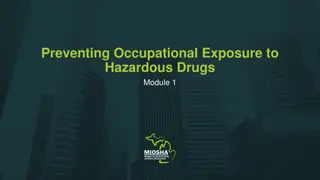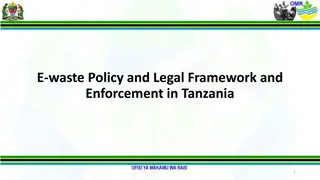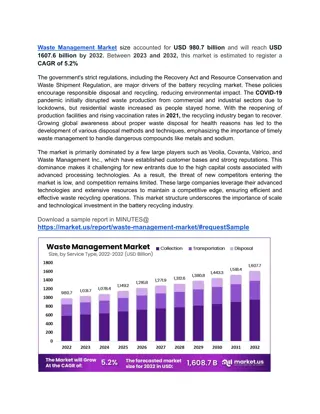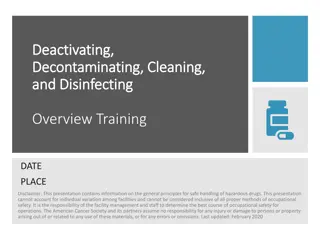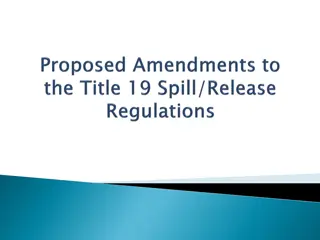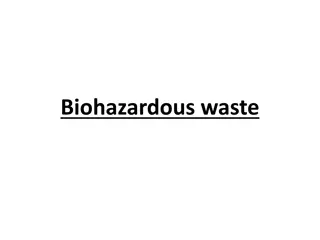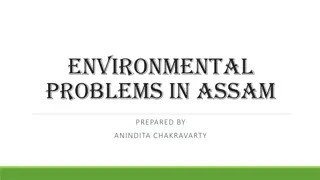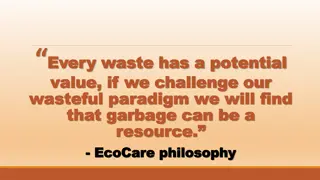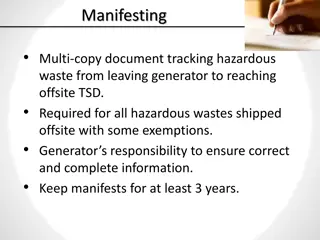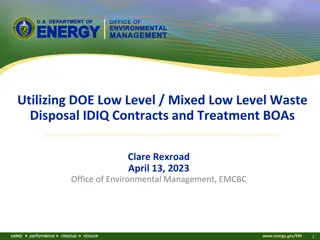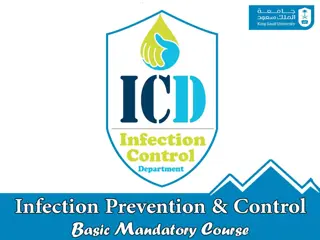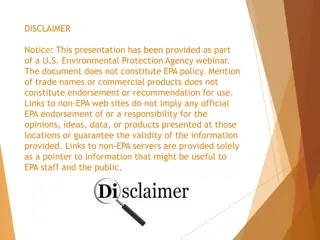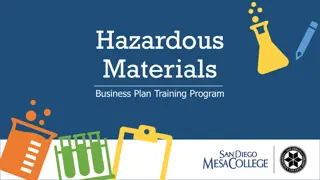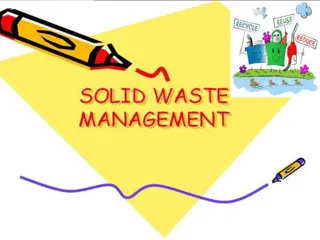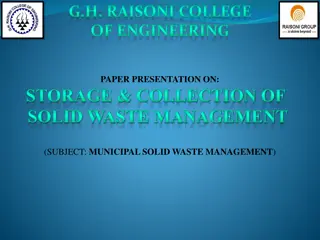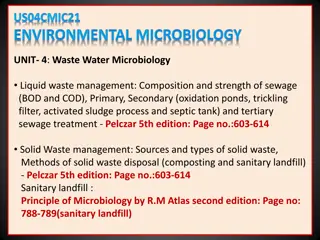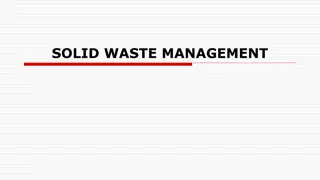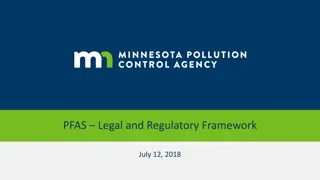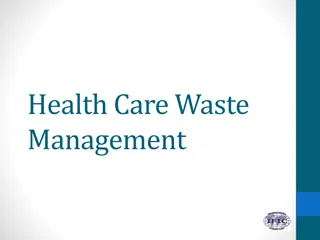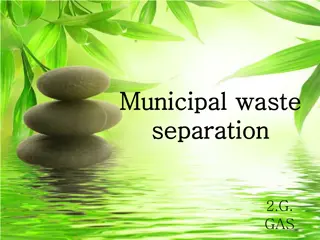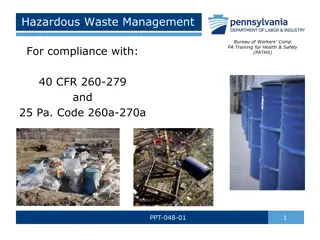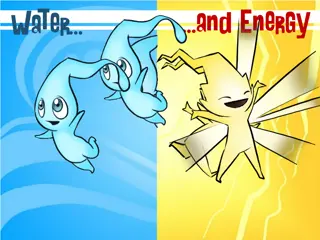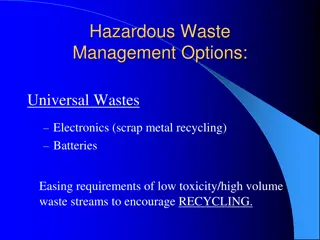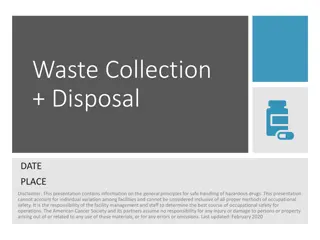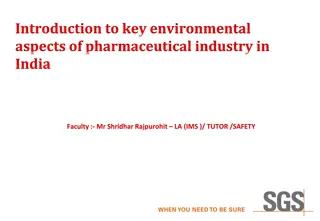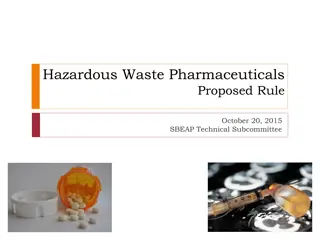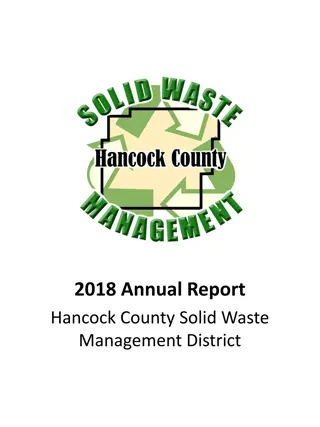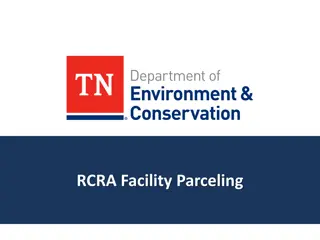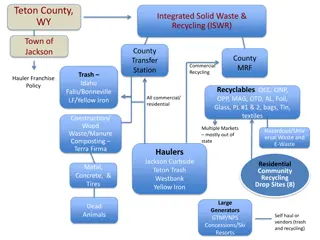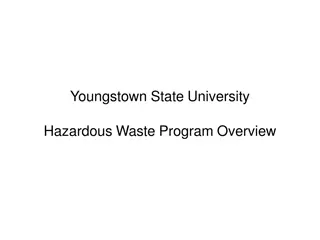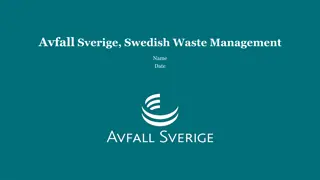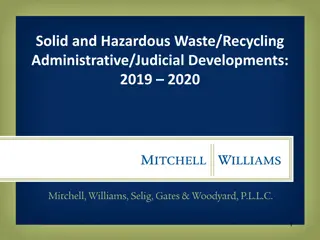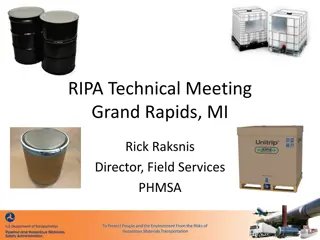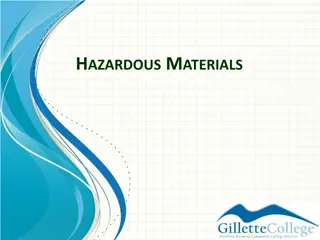Best Waste Services in Westminster
Looking for the Best Waste Services in Westminster, then visit Hart Waste and Recycling Services Ltd. They are a waste and recycling collection Service, they collect and dispose of waste and recycling at a convenient time of your choosing, 24 hours a day, & Seven days a week 365 days a year. They co
0 views • 6 slides
National Radioactive Waste Management Plan Overview
Briefing the Select Committee on Land Reform, Environment, Mineral Resources, and Energy about the South African Radioactive Waste Management Programme and the legislative background governing radioactive waste management. The presentation outlines the framework, guiding elements, waste management p
4 views • 19 slides
PP Jumbo Bags in Hazardous Material Handling
In industries dealing with hazardous materials, safety is paramount. From chemical manufacturing to waste management, proper containment and transportation of hazardous substances are critical to prevent accidents, protect workers, and comply with regulations. This is where PP jumbo bag step in as i
4 views • 5 slides
Occupational Exposure to Hazardous Drugs: Risks and Prevention
Learn about the hazards of exposure to hazardous drugs, including potential health risks such as cancer, nausea, reproductive toxicity, and organ damage. Explore training modules, drug categories, and a list of hazardous drugs to ensure workplace safety. Discover NIOSH criteria for identifying hazar
1 views • 42 slides
E-Waste Policy and Legal Framework in Tanzania
Tanzania has established a comprehensive institutional and legal framework for the management of e-waste, including the National Environmental Policy and the Environmental Management Act. The regulations governing e-waste cover licensing, permitting, standards, fees, charges, environmental impact as
0 views • 10 slides
Waste Management Market Witnesses Technological Disruptions
Waste Management Market by Waste Type (Municipal Waste, Medical Waste, Industrial Waste, and E-Waste), By Service Type (Collection, Transportation, and Disposal), By End-User, By Region and Companies - Industry Segment Outlook, Market Assessment, Com
0 views • 4 slides
Hazardous Drug Cleaning and Decontamination Training Overview
This presentation provides an overview of training on deactivating, decontaminating, cleaning, and disinfecting hazardous drug areas. It covers essential steps, personal protective equipment, materials, timing, and validation criteria. All areas handling hazardous drugs must undergo deactivation, de
0 views • 23 slides
Proposed Amendments for Hazardous Material Release Reporting Regulations
Amendments to the hazardous material release reporting regulations include consolidating definitions, adding new definitions, changing the administering agency, updating citations, and altering notification timeframes. The amendments aim to enhance emergency response and improve reporting procedures
1 views • 18 slides
Waste Bureau Mandate Presentation Highlights
The Department of Forestry, Fisheries & the Environment's Waste Bureau presentation on May 25, 2021, outlined its legal mandate, operational performance, challenges, and key focus areas for 2021/22. The Waste Bureau functions as a specialist implementing agent, promotes waste minimization and recycl
1 views • 11 slides
Understanding Biohazardous Waste Management
Biohazardous waste poses a threat to living organisms, particularly humans, due to biological hazards like medical waste or toxins. This waste includes categories such as solid, liquid, sharps, and pathological waste, each requiring proper segregation and disposal to minimize health risks. Learn abo
0 views • 15 slides
Environmental Challenges in Assam: Solid Waste and Deforestation Issues
Assam faces critical environmental problems such as solid waste mismanagement and deforestation. The syllabus emphasizes three main issues: solid waste management, deforestation, and watershed management. Solid waste, categorized by origin, hazard potential, and contents, poses significant challenge
0 views • 15 slides
Embracing the EcoCare Philosophy for Sustainable Waste Management
Challenging the current wasteful paradigm, EcoCare philosophy advocates for turning waste into a valuable resource. Addressing the challenges of waste management, the initiative aims to shift towards a people-oriented approach by promoting waste-free communities, democratizing recycling, and advocat
0 views • 14 slides
Hazardous Waste Manifesting Process Overview
Comprehensive guide on manifesting hazardous waste, including tracking, exemptions, and responsibilities. Learn about required documentation, exemptions for certain waste types, and proper handling procedures. Keep records for at least 3 years to ensure compliance with regulations.
0 views • 7 slides
Utilizing DOE Low-Level & Mixed Low-Level Waste Disposal Contracts
EMCBC manages disposal and treatment contracts for Low-Level Waste (LLW) & Mixed Low-Level Waste (MLLW). Eligible users include DOE offices, prime contractors, and subcontractors. Services cover various waste types including radioactive materials, sealed sources, and TSCA-regulated waste. Specific c
0 views • 19 slides
Waste Management Priorities in Solomon Islands
The presentation by Debra Kereseka at the PACWASTEPLUS Steering Committee Meeting highlighted key waste management priorities in the Solomon Islands. Topics covered include the management of different waste streams, challenges faced, and clarifications for the project management unit. Priorities inc
0 views • 7 slides
Comprehensive Guide to Hospital Waste Management and Infection Control
Understanding and effectively managing hospital waste is crucial for infection control. Learn about different types of hospital waste, proper segregation and disposal methods, and minimizing risks of hazardous agents. This guide covers offensive waste, infectious waste, disposal protocols, and more.
0 views • 19 slides
Making RCRA Hazardous Waste Regulations Work for Site Cleanup
Explore how to effectively utilize RCRA hazardous waste regulations and policies to facilitate site cleanup and re-use, addressing misconceptions and highlighting key strategies. Understand the importance of planning ahead and selecting appropriate cleanup remedies, waste determination, and regulato
2 views • 26 slides
Hazardous Materials Business Plan Training Program
Facilities subject to the Hazardous Materials Business Plan (HMBP) Program must implement a training program for employees on hazardous materials safety and emergency response. This includes initial training for new employees within 30 days of hire and annual refresher training. Training covers safe
1 views • 73 slides
Understanding Solid Waste Management and Classification
Waste management encompasses a wide range of materials and practices, from solid and liquid waste to hazardous and non-hazardous substances. Learn about different types of waste, sources of waste generation, classifications based on health and environmental impact, as well as origins and types. Expl
0 views • 35 slides
Municipal Waste Management Costs and Legal Requirements in Georgia
The municipal waste management system in Georgia incurs various costs including waste collection, transportation, disposal, and administration. Municipal waste charges must adhere to legal requirements such as the Polluter Pays principle and limits on charges. The Law of Georgia on Local Fees regula
0 views • 26 slides
Effective Solid Waste Management Strategies for Communities
Solid waste management is crucial for maintaining hygiene and preventing health hazards in communities. Proper storage and collection methods ensure efficient waste disposal and reduce environmental impact. This paper presentation discusses the importance of waste management, emphasizing the need fo
0 views • 43 slides
Understanding Waste Water Microbiology and Solid Waste Management
Waste water microbiology involves the analysis of liquid waste in terms of its composition, strength (BOD and COD), and treatment processes. It covers the sources and types of solid waste, along with methods of disposal like composting and sanitary landfilling. The chemical characteristics of waste
0 views • 36 slides
Understanding Solid Waste Management and Its Importance
Waste management includes the collection and treatment of solid waste to protect the environment. Waste is seen as a resource, with categories such as municipal and industrial waste. Proper waste management is crucial to prevent pollution and disease outbreaks. Principles include an integrated appro
0 views • 20 slides
Overview of PFAS Legal and Regulatory Framework
This document outlines the legal and regulatory framework surrounding PFAS (per- and polyfluoroalkyl substances), including hazardous waste designation, historical context at 3M sites, and the definition of hazardous substances and waste according to Minnesota statutes. It also discusses the potenti
0 views • 19 slides
Effective Health Care Waste Management Guidelines
Proper management of health care waste is crucial for creating a safer environment for staff, waste workers, and the public. This involves describing various types of waste, outlining waste sources, segregating waste appropriately, and listing treatment options. Key points include focusing on sharps
1 views • 28 slides
Municipal Waste Separation in Slovakia: Challenges and Trends
The production of municipal waste in Slovakia has been on the rise, even during the pandemic. Despite spending more time at home, waste generation increased due to factors like home deliveries with disposable packaging. Waste generation varied by regions, with the west producing more waste than the
0 views • 18 slides
Hazardous Waste Management Regulations in Pennsylvania
The hazardous waste management regulations in Pennsylvania outline compliance standards for handling hazardous waste, including storage, identification, transportation, recordkeeping, and emergency response. These regulations incorporate both federal guidelines under RCRA and state-specific requirem
0 views • 122 slides
Understanding Waste Management: Facts and Solutions
In this informative content, the importance of energy conservation, water preservation, and waste management is highlighted. It sheds light on the limited availability of usable water on our planet, the need for renewable energy sources, and the impact of waste generation on the environment. Learn a
0 views • 52 slides
Effective Hazardous Waste Management Strategies for Electronics and Batteries
Implementing proper waste management strategies for electronics and batteries is crucial to promote recycling and prevent environmental harm. The policy outlines procedures for disposing of electronic waste, including the collection of usable equipment for surplus handling. Additionally, it emphasiz
0 views • 9 slides
Proper Handling and Disposal of Hazardous Drugs and Waste
Guidelines for the safe handling and disposal of hazardous drugs and waste in healthcare facilities. The content covers training modules, waste collection, sources of healthcare waste, disposal methods, and legal regulations related to the disposal of hazardous drugs. Various types of healthcare was
0 views • 21 slides
Environmental Aspects of Pharmaceutical Industry in India
The pharmaceutical industry in India poses various environmental hazards through manufacturing processes, handling of hazardous chemicals, waste disposal, and natural calamities. Hazardous waste types, sources of hazards, and examples of chemical waste highlight the importance of implementing effect
0 views • 31 slides
Hazardous Waste Pharmaceuticals Proposed Rule Overview
This briefing provides an in-depth look at the Hazardous Waste Pharmaceuticals Proposed Rule from October 20, 2015. It covers which pharmaceuticals are considered hazardous waste, major provisions of the proposal, examples of listed hazardous waste pharmaceuticals, and the flow of hazardous waste ph
0 views • 40 slides
2018 Annual Report: Hancock County Solid Waste Management District Overview
The Hancock County Solid Waste Management District, established in 2002, focuses on waste reduction, recycling, and education regarding household hazardous waste. Through various programs and events, including collections, education in schools, and community involvement, the district aims to reduce
0 views • 21 slides
Hazardous Waste Facility Parceling Process
Hazardous Waste Facility Parceling involves subdividing permitted facilities into separate property tracts to facilitate ownership transfers. The process allows for the transfer of portions of the property, including hazardous waste management units, with specific actions and requirements for new ow
0 views • 5 slides
Waste Management Overview in Wyoming and Idaho Counties
Explore the waste management strategies in Teton County, WY; Fremont County, ID; Madison County; and Bonneville County. Learn about integrated solid waste and recycling programs, landfill operations, recycling drop-off locations, hazardous waste disposal, and partnerships with recycling facilities.
0 views • 5 slides
Youngstown State University Hazardous Waste Program Overview
The Hazardous Waste Program at Youngstown State University follows a cradle-to-grave approach, encompassing laws, regulations, inspections, roles, and responsibilities related to hazardous waste management. It delves into the identification, labeling, disposal, and transportation of hazardous waste,
0 views • 18 slides
Sustainable Practices in Swedish Waste Management
Avfall Sverige, the trade association for waste management in Sweden, focuses on reducing waste and increasing recycling rates. With a vision of zero waste, they work towards influencing, developing, and cooperating to achieve sustainable waste management practices. Swedish waste management statisti
0 views • 9 slides
Recent Developments in Solid and Hazardous Waste Recycling Regulations
This article discusses various administrative and judicial developments in solid and hazardous waste recycling, focusing on federal and state decisions, litigation, regulations, and policies from the past year. It also delves into the specific waste issues associated with Arkansas Medical Marijuana
0 views • 67 slides
RIPA Technical Meeting Grand Rapids, MI
The Pipeline and Hazardous Materials Safety Administration's (PHMSA) strategic framework emphasizes innovation and safety in transportation of energy and hazardous materials. Goals include cultivating excellence, building trust, and pursuing operational excellence. Initiatives such as IBC repair tes
0 views • 11 slides
Safe Transportation of Hazardous Materials: A Comprehensive Guide
This comprehensive guide explores the safe transportation of hazardous materials, covering topics such as requirements for hazmat drivers, classifications of hazardous materials, handling procedures, placarding, and regulatory compliance. Learn about identifying, packaging, labeling, and transportin
0 views • 31 slides



